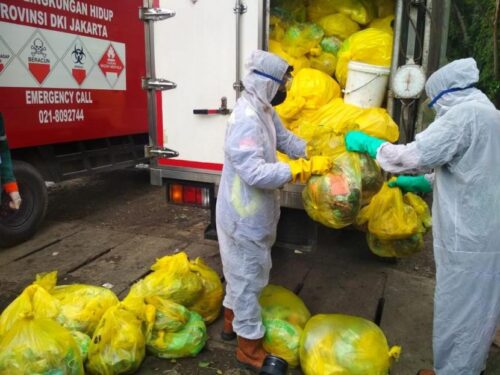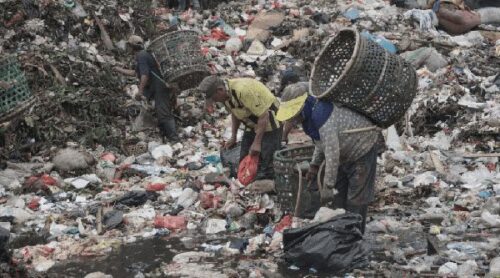Waste Management Emergency during the COVID-19 Pandemic
It’s not exaggerating to say that the pandemic became the face of 2020, a global phenomenon that forces humankind to change their patterns of activities and lifestyle. Working from home, learning from home, and basically moving all activities to be done at home.

Even though the Large Scale Social Restrictions is no longer implemented as strict as the first 4-5 months since the first Coronavirus case is found in Indonesia, the reality is that the number of COVID-19 positive cases continues to rise. As of 14th December 2020, 5.489 new cases are reported in Indonesia, with a total active case amounting to 623.309.
The changes in lifestyle that are focused on activity at home increasingly impact the waste production patterns, especially in Jakarta. There has been a shifting in waste emergences from commercial areas to household areas, leading to a significant increase in household waste.



New Problem for Domestic Waste
The waste that was produced during the pandemic increased in terms of both the category and the volume since people use more disposable masks, tissues, hand sanitizers, and also disinfectants in order to curb the spread of the virus. These things fall into the category of medical and hazardous waste, especially disposable masks since they cannot be identified whether it’s been used by sick or healthy people.
According to the Head of Hygiene Management of Jakarta Environmental Agency, Edy Mulyanto, the number of infectious waste from households in Jakarta between April and October 2020 amounts to 857,71 kilograms, and most of them are discarded facemasks.



Not to mention the fact that 81% of Indonesian people’s waste is still mixed, hence increasing the risks of COVID-19 transmission.
The far-from-ideal waste management system at the household level put our waste management officers at great risk of contracting the Coronavirus. The virus’ ability to live on various surfaces also made the rate of transmission even higher and massive.
The virus that was in the disposable masks can be transmitted to other waste, and then came into contact with waste officers and scavengers who did not wear proper Personal Protective Equipment. These waste management officers and waste pickers can easily be exposed to the virus when doing their daily job in the field, be it in collecting, segregating, or managing our waste if they are not given the proper equipment and also education regarding COVID-19.
On the other hand, waste management is a basic and fundamental service that needed to be done every day, especially because the consumption and production activities do not stop.
On 24th March, the United Nations Environment Programme (UNEP) urge governments to treat waste management in their countries as a public service that is important and of high priority, especially in treating domestic, medical, and other possibly hazardous waste as a result of the pandemic. This measure is none other than to minimize the secondary risks towards both the people’s health and the environment.
From the official website of the Association of Cities and Regions for Sustainable Resource Management, it can be seen that several countries in Europe have performed some adaptive measures in their waste management system, and there are also many recycling and composting centers and facilities that were closed for an undecided period.
Citizens in developed countries are encouraged to store their waste in a closed, airtight, and waterproof container, and to compost their organic waste. Some countries also mixed the medical waste together with residual waste and then process it in incineration facilities with high temperatures.
Based on the data from Indonesia’s Ministry of Environment and Forestry, the increased production of medical waste during the pandemic is around 30% to 50%. Moreover, according to reports from 34 provinces, at least the total volume of waste up until October 2020 is 1.662,75 tons.



Unfortunately, Indonesia does not yet have the ideal system nor the technology in terms of waste management, so the waste management method during the pandemic still relies on the conventional collection and disposal methods, with most of the waste still mixed. This is of course highly concerning when we take into consideration how the waste management officers are prone to be exposed to the virus.
Based on the estimates that Waste4Change performs, the number of waste officers in Indonesia is around 300.000 people, and the number of waste pickers is twice the figure, which is 600.000 people. That means there are around 1,8 to 2,4 million families of waste pickers. In another word, there are more than 2 million people who are at high risks of contracting the COVID-19.



Fighting Corona from the Rear End
The government needs to take this matter seriously and act with the same level of urgency as with protecting our health workers. There needs to be a standard and also regulations that govern the waste management from downstream to upstream, as well as to allocate sufficient budget for the waste management sector in order to ensure the safety and health of our waste management workers as the rear guards in this battle against the Coronavirus.
As we fight to end this pandemic, just like in soccers or football, we need to defend our striker, the ones on the frontline, which are the health workers. However, in order to really win this battle, we also need to pay attention to the rear end, and in this case the waste pickers and waste management officers. If not, then we probably cannot win.



The Coronavirus pandemic is probably the right turning point for Indonesia in terms of its waste management. It is time that we revolutionize the waste management system from upstream to downstream and invests in the waste management sector. Waste management handling from the sources has actually been governed in Indonesia’s National Strategy and Policies (JAKSTRANAS), and it is high time to increase its status to highly urgent.
For a starter, the Ministry of Environment and Forestry has taken a good measure by issuing an order KLHK SE.2/MENLHK/PSLB3/PLB.3/3/2020 regarding the instructions for Managing Infectious Waste and Household Waste in the event of the Coronavirus disease (COVID-19).
This instruction needs to be escalated into a binding regulation, and oblige for the right SOPs in order for the local governments to implement and made it as a baseline for budget arrangements. Even The National Disaster Relief Agency (BNPB) needs to pay attention to the waste management sector in order to prevent the Coronavirus emergency from being prolonged.
Last but not least, the general public also needs to start segregating their waste at home, especially for waste that is considered infectious and hazardous. Let’s protect each other from the Coronavirus by treating our waste responsibly.
Citizens can also upscale their roles in waste management by utilizing their more “free time” at home to learn further about waste segregation and category, especially in handling and disposing of medical waste that has a high risk of contamination, as well as learning to make their own compost at home to reduce the volume of waste that ends up in the landfill.



